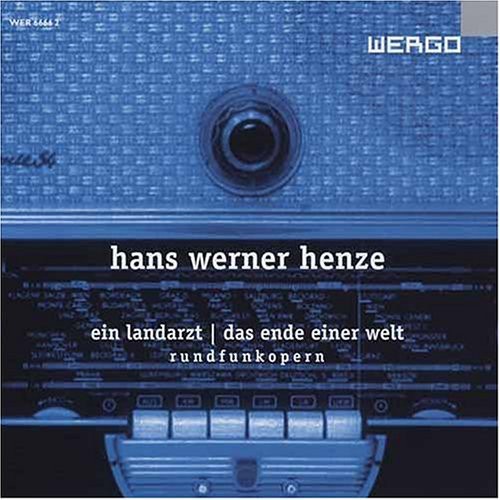Show results for
Deals
- 4K Ultra HD Sale
- 50s Films Sale
- Action Sale
- Alternative Rock Sale
- Anime sale
- Award Winners Sale
- Bear Family Sale
- Blu ray Sale
- Blues on Sale
- British Sale
- Christmas in July
- Classical Music Sale
- Comedy Music Sale
- Comedy Sale
- Country Sale
- Criterion Sale
- Electronic Music sale
- Folk Music Sale
- Horror Sci fi Sale
- Kids and Family Sale
- Metal Sale
- Music Video Sale
- Musicals on Sale
- Mystery Sale
- Naxos Label Sale
- Page to Screen Sale
- Paramount Sale
- Rap and Hip Hop Sale
- Reggae Sale
- Rock
- Rock and Pop Sale
- Rock Legends
- Soul Music Sale
- TV Sale
- Vinyl on Sale
- War Films and Westerns on Sale

Ein Landarzt/ Das Ende Einer Welt
- Format: CD
- Release Date: 10/11/2005

Ein Landarzt/ Das Ende Einer Welt
- Format: CD
- Release Date: 10/11/2005
- Label: Wergo Germany
- Number of Discs: 2
- UPC: 4010228666625
- Item #: 1324395X
- Genre: Classical, Opera/Operetta
- Release Date: 10/11/2005
CD
Price: $25.64

Get it between
Thu. Jul 17 - Fri. Aug 1
Deliver to
Product Notes
In the beginning of the 1950s, Hans Werner Henze wrote two radio operas for the former North West German Radio. The genre was developed around the 1930s and means a form of opera without any visual elements and hence without a stage. Under such circumstances the plot has to reach the listeners' ears by other means - by making the text exceptionally easy to follow, and by means of acoustic special effects like echo or sound collages.
With this CD, WERGO publishes the première of the revised versions on Sept. 27, 1996, in the Philharmonie in Cologne: Franz Kafka's oppressive surrealism in "Ein Landarzt" (A Country Doctor) and Wolfgang Hildesheimer's scathing satire in "Das Ende einer Welt" (The End of a World). In "Das Ende einer Welt", Henze himself took the role of the narrator, which underlines how topical the subject matter of this work remains for him. On the occasion of the première of the revised versions of these two operas the composer wrote of the "inner connection" between the works: "There is, first, the state of a man who has taken leave of his senses, of being exposed, of the most terrible isolation, as if 'ordered' by invisible powers acting on a 'higher level.' There is talk of deception, of self-deception, of deceiving and being deceived, of the volatility and unreliability of life matters, beginning with the most simple (or most banal) and ending with the metaphysical and the grotesque." It is also conceivable that the increasing disquiet that took hold of Henze in the early fifties with regard to an evolving society that nonetheless remained the same at it's core ("Everywhere the old was not yet old enough, while the new pointed to a future that did not look very promising, " wrote the composer in his essay "Nach dem Krieg" [After the war]) took musical form in his two radio operas: on the one hand, a nightmare vision of horror; on the other, a cynical farce.
